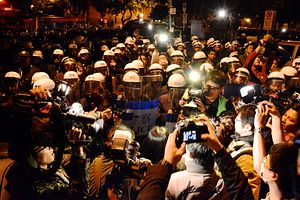The ongoing protests in Taiwan against a trade pact with China seem to demonstrate clearly that China’s economic engagement policy toward Taiwan has serious limits, thus marking a turning point in cross-strait relations and taking peaceful unification off the list of options. Such views are flawed. On the contrary, this movement might actually facilitate the unification process.
Why? Let’s first look at the central goals of the SunflowerMovement. This movement has three main goals (possibly not shared by all members and at all times): 1) eliminate the “black box” decision-making process by the Ma administration; 2) reject the service trade pact with mainland China; and 3) fight back against the capitalist system controlled by big tycoons in Taiwan. There are good reasons to believe that the movement will not achieve any of these three goals.
To be sure, this Sunflower Movement is successful in that it has generated strong support to review Taiwan’s democratic system and raised serious issues about the true relationship between mainland China and Taiwan. Beyond these minor successes, the movement is a failure.
First, the anti-black box movement will not succeed. Research has found that even in the U.S., an advanced democracy, policy changes are usually a result of insiders’ actions rather than public pressure. In the case of Taiwan, both the KMT and the DPP prefer to cut deals behind the doors in the Legislative Yuan led by Mr. Wang Jin-pyng, i.e., the infamous “consultation among parties system (朝野协商制度).” Does the Sunflower Movement have the will and capacity to overthrow such institutions that are deeply rooted in Taiwan’s political culture? Mission impossible. Unless somehow the Sunflower Movement can turn into an independent political force in the future, there is little hope that the black box culture will disappear from Taiwan’s politics.
Second and more importantly, although not many members of the Sunflower Movement would like to admit it, the essence of this movement is not just about a trade agreement; it is rather about independence vs. unification. Most Taiwanese who oppose the trade agreement do so mainly because they fear that such an agreement will further increase the mainland’s political influence in Taiwan, thus gradually killing the independence movement in Taiwan. Even if the trade agreement will benefit Taiwan’s economy, they choose Taiwanese identity over economic benefits. This indeed shows the limits of mainland China’s economic engagement policy toward Taiwan. Even if this movement successfully kills the trade agreement, does it mean the integration process between mainland China and Taiwan will be stopped? Unlikely. The problem for Taiwan is that there is no alternative besides relying on mainland China for economic development in the long run. Already, because of former President Chen Shui-bian’s self-isolation policy toward the mainland, Taiwan has been surpassed by South Korea in many key areas. The U.S. cannot provide a big enough market to absorb Taiwan’s exports and investments even if Taiwan somehow manages to join the Trans-Pacific Partnership, which is very uncertain given the tough requirements from the U.S. side.
The tragedy for Taiwan is that its economy is too small and its military is too weak against the mainland. It might be an exaggeration to say that Taiwan is doomed, but it is clear that Taiwan must develop a positive relationship with the mainland in one way or another. To continue the independence movement is just wishful thinking; it should instead work toward maintaining as much autonomy as possible in future negotiations with the mainland.
Third, from a global point of view, the Sunflower Movement will fail because it in effect seeks to challenge globalization and the capitalist system within which globalization is embedded. Mainland China’s gigantic economy is functioning like a magnet that attracts profit-seeking capitalists in Taiwan who, frankly, do not give much attention to independence or Taiwanese identity. One interesting development in the ongoing protests is that the voice of various industries in Taiwan is not getting adequate attention from the media. Capitalists in Taiwan have already voted for the mainland with their feet, moving to cities like Shanghai. Will the Sunflower Movement change the profit-seeking nature of capitalists in Taiwan? Another mission impossible.
Although the Sunflower movement has been praised by some domestic and foreign observers as rational and justice-seeking and a possible third force in Taiwan’s political future, unfortunately the Sunflower Movement will not achieve any of the three goals listed above, mainly due to Taiwan’s structural problems in its political, social and economic systems. None of the three structures will change significantly regardless of which party, KMT, DPP or any other political force, is in power.
One positive outcome that might come out of the current crisis is mainland China’s realization that its economic engagement policy toward Taiwan may have reached its limits. To truly win the hearts and minds of Taiwan, the mainland needs to go beyond economic engagement policy by making attractive political initiatives. This is a daunting task given the strong distrust between the two, but it is a necessary step for the mainland to reassure Taiwan. Wise heads in Beijing would surely recognize this and be flexible when it comes to political negotiations. Peaceful unification is very much alive so long as Beijing makes the right choices.

































